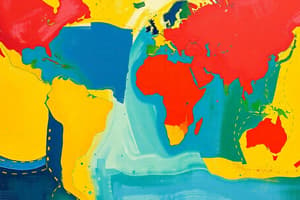Podcast
Questions and Answers
What was a major motivation for European nations to explore and colonize new lands?
What was a major motivation for European nations to explore and colonize new lands?
- To discover new navigation and cartography techniques
- To establish new trade routes and seek wealth and riches (correct)
- To spread Christianity
- To promote peaceful coexistence with indigenous populations
Which Portuguese explorer led the first expedition to circumnavigate the globe?
Which Portuguese explorer led the first expedition to circumnavigate the globe?
- Christopher Columbus
- Ferdinand Magellan (correct)
- Henry Hudson
- Vasco da Gama
What was the name of the process that resulted in the transfer of plants, animals, and diseases between the Old and New Worlds?
What was the name of the process that resulted in the transfer of plants, animals, and diseases between the Old and New Worlds?
- Geographic Rediscovery
- Columbian Exchange (correct)
- Voyages of Discovery
- Age of Exploration
Which Italian explorer was sponsored by England and explored North America?
Which Italian explorer was sponsored by England and explored North America?
What was a major consequence of European exploration and colonization of the Americas?
What was a major consequence of European exploration and colonization of the Americas?
What was a key result of the Age of Exploration in terms of geography?
What was a key result of the Age of Exploration in terms of geography?
Flashcards are hidden until you start studying
Study Notes
Age of Exploration (15th-17th centuries)
Causes of Exploration
- Desire for wealth and riches
- Search for new trade routes
- Spread of Christianity
- Competition among European nations
- Advancements in navigation and cartography
Key European Explorers
- Portuguese
- Vasco da Gama (1497-1499): discovered sea route to India
- Ferdinand Magellan (1519-1522): led first expedition to circumnavigate the globe
- Spanish
- Christopher Columbus (1492-1504): sponsored by Spain, reached the Caribbean
- Hernán Cortés (1519-1521): conquered the Aztec Empire in Mexico
- Italian
- John Cabot (1497-1498): sponsored by England, explored North America
- Dutch
- Henry Hudson (1607-1611): explored Hudson River and Hudson Bay
Impact of Exploration
- Columbian Exchange: transfer of plants, animals, and diseases between the Old and New Worlds
- Colonization: establishment of European settlements in the Americas
- Enslavement and exploitation: indigenous populations and Africans were exploited for labor and resources
- Redrawing of world maps: new discoveries led to a redefinition of the world's geography
Age of Exploration (15th-17th centuries)
Causes of Exploration
- Desire for wealth and riches led to an increase in exploration
- Search for new trade routes driven by a need for economic growth
- Spread of Christianity motivated explorers to reach new lands
- Competition among European nations fueled exploration and discovery
- Advancements in navigation and cartography enabled explorers to venture further
Key European Explorers
-
Portuguese
- Vasco da Gama discovered the sea route to India (1497-1499)
- Ferdinand Magellan led the first expedition to circumnavigate the globe (1519-1522)
-
Spanish
- Christopher Columbus reached the Caribbean (1492-1504) sponsored by Spain
- Hernán Cortés conquered the Aztec Empire in Mexico (1519-1521)
-
Italian
- John Cabot explored North America (1497-1498) sponsored by England
-
Dutch
- Henry Hudson explored the Hudson River and Hudson Bay (1607-1611)
Impact of Exploration
Columbian Exchange
- Transfer of plants, animals, and diseases between the Old and New Worlds
Consequences of Exploration
- Colonization: establishment of European settlements in the Americas
- Enslavement and exploitation: indigenous populations and Africans were exploited for labor and resources
Redefining the World
- Redrawing of world maps: new discoveries led to a redefinition of the world's geography
Studying That Suits You
Use AI to generate personalized quizzes and flashcards to suit your learning preferences.




